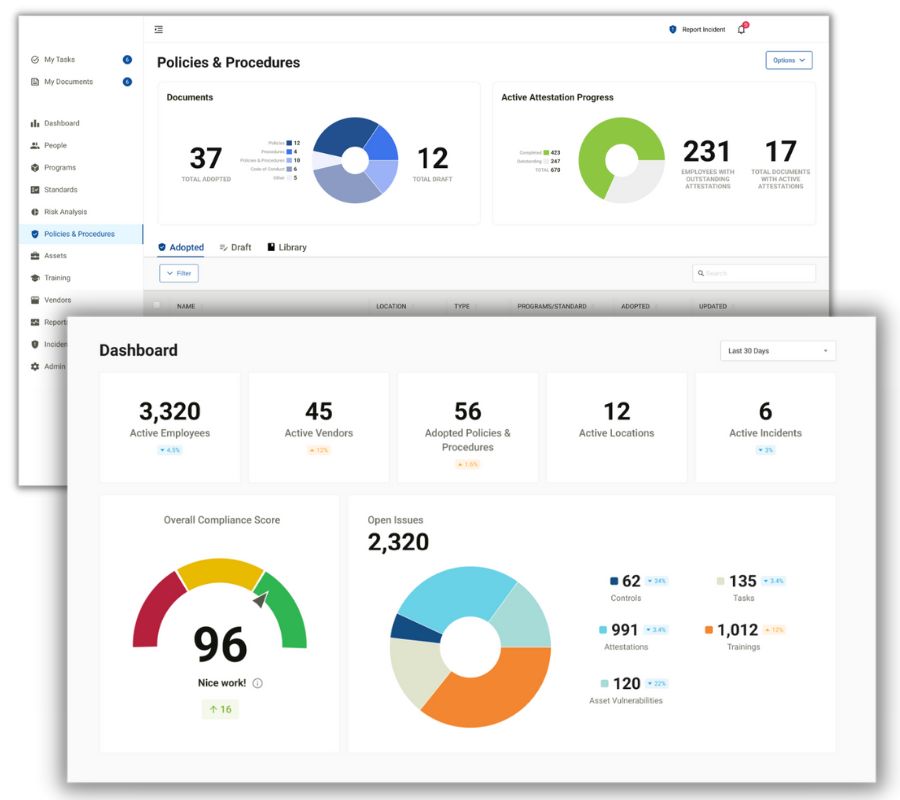The Best Healthcare Compliance Software
The best healthcare compliance software is a comprehensive management tool, that helps chief compliance officers to effectively oversee compliance efforts across their organization’s facilities, by proactively managing risk, streamlining workflows, improving collaboration, and demonstrating the achievement of compliance objectives to stakeholders.
What Are The Benefits Of Healthcare Compliance Software?
For a chief compliance officer the benefits of using healthcare compliance software are:
1. Increased Visibility: Compliance software provides real-time visibility into compliance activities including incident management, allowing the chief compliance officer to monitor progress, track key metrics, and identify areas that require attention. This increased visibility enhances the chief compliance officer’s ability to effectively oversee compliance efforts across the organization.
2. Streamlined Workflows: Compliance software automates many administrative tasks related to compliance management, such as tracking compliance activities, scheduling self audits and managing documentation. This saves time and reduces manual effort for all compliance team members.
3. Enhanced Reporting: Customisable reporting and analytics allow compliance officers to generate detailed reports on compliance activities, performance metrics, and audit findings. These reports help communicate compliance efforts to senior management, regulators, and other stakeholders, showcasing a commitment to compliance excellence.
4. Centralized Documentation: By providing a centralized repository for storing and managing compliance-related documents, such as policies, procedures, training materials, and audit reports, healthcare compliance software ensures that all relevant documentation is organized, up-to-date, and easily accessible when needed.
5. Improved Collaboration: Facilitating collaboration and communication among compliance team members, stakeholders, and other departments, compliance software for healthcare organizations improves coordination and alignment on compliance initiatives. This enhances the chief compliance officer’s ability to create an exemplary compliance culture across the organization.
6. Reduced Risk: By automating compliance processes, providing real-time visibility into compliance activities, and facilitating proactive risk management, healthcare regulatory compliance software helps compliance officers minimize risk and mitigate potential compliance failures.
What To Consider When Purchasing Healthcare Compliance Software?
 There are three aspects to consider when purchasing healthcare compliance software:
There are three aspects to consider when purchasing healthcare compliance software:
1. Essential Functionality
2. Software Specifications
3. Business Considerations
The following buyer’s framework has been designed to guide you to find the most suitable solution for your organization’s compliance objectives, through a comprehensive and objective assessment of available options.
1. What Essential Functionality Is Required For Healthcare Compliance Software?
The best healthcare compliance software solution is a flexible all-in-one healthcare compliance system that follows a recognized framework like the OIG-HHS Seven Fundamental Elements Of An Effective Compliance Program. It should offer real-time visibility of compliance objectives across all the organization’s facilities, and because all organizations are different, it should have both prebuilt and fully customizable options.
The following is the essential functionality for your organization’s healthcare regulatory compliance requirements:
1. All In One Compliance
- Does the software cover all healthcare regulatory areas such as HIPAA, OSHA and SOC 2 compliance?
- Does the software allow you to customize your own compliance standards?
- Does it include OIG exclusion screening and monitoring?
2. Risk Management
- Self audit and external audit management
- Risk scoring
- Gap identification
- Remediation planning
3. Incident Management
- Anonymous incident reporting for employees
- Breach incident reporting
- Breach management tools for internal and external incidents
4. Policies & Procedures
- Templated and customizable policies and procedures
- Policy and procedure management
- Central storage of policies and procedures
5. Employee Training
- Train, track and manage compliance training for employees
- Up-to-date compliance training modules
- Personized, individual employee training certificates
6. Vendor Management
- Identify and track business associates
- Customizable business associate agreement templates
- Store and track business associate agreements
7. Reporting
- Customizable reporting templates including reports to demonstrate compliance to stakeholders or regulators
- Centralized documentation storage
- Audit logging and reports

FREE BUYER'S GUIDE
How To Choose Compliance Software
Get our comprehensive buyer's guide to purchasing healthcare compliance software for your organization
Delivered via email so please ensure you enter your email address correctly.
Your Privacy Respected
HIPAA Journal Privacy Policy
2. What Are The Software Specifications To Consider For HIPAA Compliance Solutions?
Software specifications are aspects of a solution, such as usability or scalability, that are not about specific functionality but describe the broader qualities of the software. Specifications can help inform your decision when comparing healthcare compliance management software options.
1. Ease Of Use
- Assess the software’s overall user experience, including the user interface and navigation menus.
- Does the software have an intuitive interface that includes workflows for conducting compliance activities?
- Do dashboards demonstrate at a glance the overall compliance state of the organization, while also showing individual tasks, messages, and alerts like in our example below?

- How user-friendly are the training modules that employees will be required to take as part of the organization’s compliance?
2. Customization
- Are workspaces customizable?
- Are documents such as policies customizable?
- Are reports customizable?
3. Scalability & Flexibility
- Can the software accommodate your organization’s current scale, for example, to manage multiple locations?
- Can it scale up and adapt to your organization’s evolving future needs?
4. Integration Capabilities
- How will the software integrate with your existing IT infrastructure and the other third-party applications used within your organization?
- Cloud-based solutions are the easiest to implement, and have the advantage that ongoing infrastructure maintenance is the responsibility of the software vendor.
5. Future Proofing
- How will the software vendor address regulatory changes and updates to ensure ongoing compliance in a timely manner?
3. What Are The Business Considerations When Choosing Healthcare Compliance Software?
Often when evaluating functionality and specifications, a favoured vendor will quickly emerge. Nevertheless, it is recommended that you fully examine the commercial and business considerations before a final decision is made.
1. Vendor Reputation
- Is the software endorsed by any medical associations?
- Does the vendor have up to date case studies and testimonials from other similarly sized healthcare organizations that have successfully implemented the solution?
- It is always a good idea to speak directly with existing customers about their experiences with both the software and the vendor.
- It is better to speak to “random” customers than those provided by the vendor because it is highly unlikely they will provide a reference for an organization with a poor experience.
- If you have compliance department contacts across the healthcare industry consider reaching out to ask if anyone has direct experience of your favoured vendor.
2. Vendor Training & Support
- Does the vendor offer live support throughout the initial implementation phase?
- What training is offered for your compliance team?
- After setup what ongoing support is offered? Is it 24 x 7?
3. Costs
- Look for a transparent breakdown of pricing structures, including initial setup costs, licensing fees, and any additional charges for support or updates.
- Is there a one-time purchase cost or is it a subscription-based model? Subscriptions have become the most common way to purchase cloud based software.
- If fees are charged on a per-seat subscription basis then how will they change as the organization grows?
- If cost is an issue and it appears that the solutions on your shortlist are similar, ensure you create a price comparison table taking all factors into account, such as extra costs for training or support.
- You can also do the same comparison exercise based on growth scenarios. You don’t want to choose a cheaper solution now that turns in to a far more expensive solution later on.
- Does the vendor offer discounts? For example, they may offer a group discount for an association you may already be a member of. It’s always worth asking as often this can be 15% or more off the list price annually.
4. Free Trial Or Money Back Guarantee
- A full demonstration may be enough to help you make your decision, but sometimes a short trial period can be helpful if you have any doubts. It also allows you to ask your colleagues take a look at their convenience before a final decision is made.
- Not all software is suitable for a free trial because of the effort required for the setup by both vendor and the healthcare organization. In this scenario you could ask for a guarantee that if you are not satisfied you have the option to back out of the agreement within a certain period.
5. Software Licence Period
- What is the commitment period you are signing up for? Is it month-by-month or year-by-year? Is there a minimum period such as three or five years? Read the small print on any agreement before you send it to your legal department.
- The advantage with shorter periods is that onus is on the software vendor to ensure you are kept happy because they won’t want you to cancel. Alternatively, if you are willing to sign up for a longer period then you may be able to negotiate a lower annual cost.
 Free Buyer’s Guide
Free Buyer’s Guide
We have compiled a free buyer’s guide to choosing the best healthcare regulatory compliance software. This includes a checklist for the three aspects discussed in this article. Download the guide now by filling in the form on this page.

FREE BUYER'S GUIDE
How To Choose Compliance Software
Get our comprehensive buyer's guide to purchasing healthcare compliance software for your organization
Delivered via email so please ensure you enter your email address correctly.
Your Privacy Respected
HIPAA Journal Privacy Policy

FREE BUYER'S GUIDE
How To Choose Compliance Software
Get our comprehensive buyer's guide to purchasing healthcare compliance software for your organization
A link to our free buyer's guide will be sent to your email address
Your Privacy Respected
HIPAA Journal Privacy Policy
HIPAA Journal featured on





 Free Buyer’s Guide
Free Buyer’s Guide